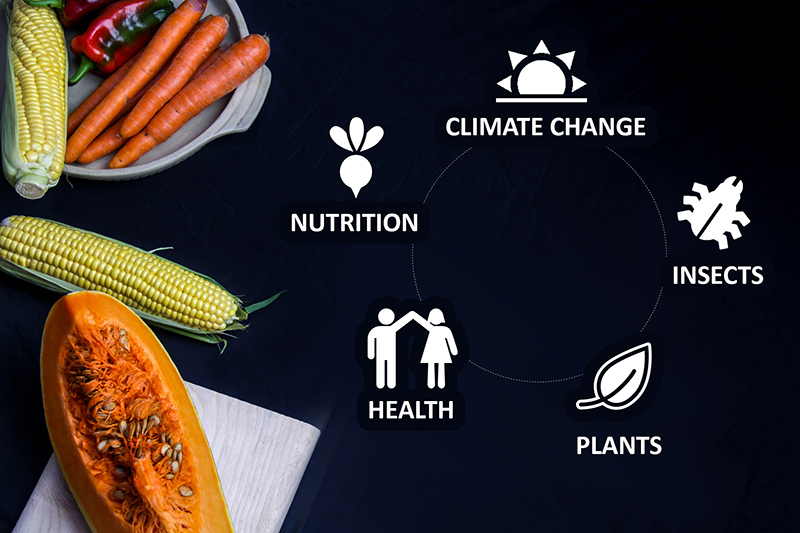Joining the dots: plant pathology, human health & climate change

In July CONNECTED ran a workshop which brought together collaborators from a range of disciplines to consider ideas for research which harnesses knowledge of plant vector-borne diseases, nutrition and climate change.
These areas are interconnected, as plant virus diseases can affect fruit, vegetable and legume yields and mean that available food supplies are less varied and diets are less able to provide essential micronutrients. Malnutrition affects human immunity, making people more susceptible to communicable diseases, not to mention being the leading driver of non-communicable diseases worldwide.
Meanwhile climate change affects insect and plant disease distribution, spreading these issues to new geographical areas and impacting vulnerable communities the most.
By bringing together expertise in health and nutrition, climate change impacts, entomology and plant pathology, we can fully consider the connections between plants, animals and humans and their changing environments, and how best to tackle these challenges.
The workshop was funded by the Elizabeth Blackwell Institute at the University of Bristol.
The outcomes
The participants established research priorities, climate change priorities and nutrition priorities, with key themes as follows:
- We must bring together disciplines and link plant, animal and environment to best tackle plant vector-borne diseases
- We must increase the surveillance and detection of diseases/emerging threats to enable more successful prevention
- There is a need to validate models of environmental-pathogen-yield connections
Emerging topics were:
- Ability to amplify 100000 of targets in parallel within a single PCR reaction, however data analysis is difficult
- High throughput vector surveillance and screening
- Focusing on the most important crop/disease for nutritional relevance
- Crop modelling
- Community engagement to understand drivers, needs, research questions and to find out what users want in terms of advice/information/tools
- Understanding nutritional impacts of particular plant vector-borne diseases (plant VBDs)
- Mycoviruses
- Simulation and prediction of weather patterns
- Increase in capacity and education – behavioural psychology could be useful
What can we do next with this information?
- As this multidisciplinary project helped identify current opportunities and challenges in human health and plant VBD research, funding proposals can now be developed
- Possible emerging research projects will be taken forward and pursued
- Better understand the wider social implications (changes to diets) that plant VBDs have on local communities by affecting crop production in a changing climate
- Engage with local communities, providing information on effective management practices to control VBDs (including Integrated Pest Management), impacts and steps to mitigate the damage of seasonal weather events, and whether VBDs are changing their diets and nutrition
- Combine African seasonal weather data with plant VBD surveillance data to create a VBD risk tool for farmers
If your work is relevant to these areas and you would like to be involved, please get in touch.

